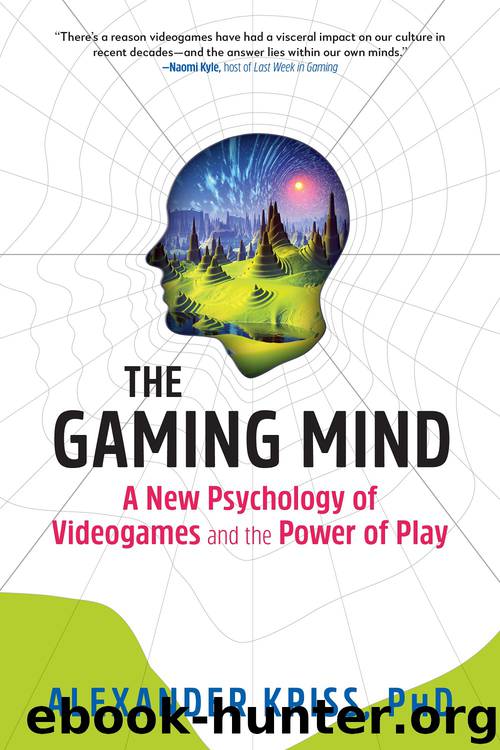The Gaming Mind by Alexander Kriss

Author:Alexander Kriss
Language: eng
Format: epub
Publisher: The Experiment
Published: 2020-02-25T22:57:54+00:00
Chapter 6
Addiction
How should we understand and treat videogame addictions?
Do we always, always to the point of misery, do a thing?
—Saul Bellow, Mr. Sammler’s Planet
Liz played Candy Crush Saga. A lot.
Its grip was insidious: At first, she barely noticed that tapping and swiping at the colorful match-three iPhone game had largely replaced the time she used to reserve for sleep. While playing she would absent-mindedly pluck at hairs on the back of her head; she started worrying that she was giving herself a bald spot. But Liz kept playing. “I can’t help it,” she told me during one of our sessions. “I’m addicted.”
Liz was a person of many contradictions. At fifty, she alternately expressed feeling like “a kid who never grew up” and “a decrepit old woman.” She worked sporadically as a temp while harboring a passion for acting, though she rarely went for auditions. Single and with virtually no history of romantic involvement, Liz would sometimes blame herself for being “undesirable,” while at other times she derided the world for being filled with hateful, petulant men. Across these areas of life, her sense of self-worth and efficacy fluctuated wildly, and often, even during a single psychotherapy session, between self-loathing and grandiosity. A lifetime of feeling vulnerable to the quixotic whims of an uncaring world had led to a series of internal, unconscious compromises that, while born out of an instinct for self-protection, now left Liz deeply narcissistic in the Winnicottian sense. She refused to accept that the outside world did not always, in some way, connect back to her fantasies.
When Liz was younger this took the form of interpreting every interaction with a man as a sexual advance, every conversation with a woman as charged with envy. Now in middle age the interpretations had shifted, but the themes were unchanged. Whenever Liz rode the city’s subway train and saw young people looking at their phones (so, in other words, every time she was on the train), she told me with utmost conviction that she “knew” they were secretly taking photos of her to show their friends later, in order to “share a laugh about this sad, disgusting old woman.” If she could no longer conceptualize herself as the most beautiful, she must surely be the ugliest—either was preferable to the idea that she fell somewhere in the middle, and that most people around were simply indifferent to her.
Suffice it to say, Liz felt lost, angry, anxious, and frequently depressed—one would think Candy Crush would be the least of her problems. But about six months into our treatment the game started overshadowing all other topics of discussion. It began as the reason why Liz “couldn’t think” during sessions. “I’m sorry, but I doubt I’ll be able to focus on much of anything today,” she would begin. “I was up all night playing on my phone, so now I’m just really . . . blah.”
In the preceding weeks Liz had been making some small but significant changes in her life, such as going on more auditions and starting to create (but not quite finalizing) an online dating profile.
Download
This site does not store any files on its server. We only index and link to content provided by other sites. Please contact the content providers to delete copyright contents if any and email us, we'll remove relevant links or contents immediately.
| Adult Children of Alcoholics | Alcoholism |
| Drug Dependency | Gambling |
| Hoarding | Obsessive Compulsive Disorder (OCD) |
| Sexual | Smoking |
| Substance Abuse | Twelve-Step Programs |
The Hacking of the American Mind by Robert H. Lustig(4386)
Right Here, Right Now by Georgia Beers(4217)
Fingerprints of the Gods by Graham Hancock(4006)
Goodbye Paradise(3812)
Bad Pharma by Ben Goldacre(3428)
Happiness by Matthieu Ricard(3051)
The Social Psychology of Inequality by Unknown(3037)
More Language of Letting Go: 366 New Daily Meditations by Melody Beattie(3031)
The Plant Paradox by Dr. Steven R. Gundry M.D(2627)
Drugs Unlimited by Mike Power(2596)
Confessions of a Shopaholic by Sophie Kinsella(2376)
Borders by unknow(2319)
Make Love Not Porn by Cindy Gallop(2112)
Dry by Augusten Burroughs(2102)
Stop Being Mean to Yourself: A Story About Finding the True Meaning of Self-Love by Melody Beattie(2006)
Getting Off by Erica Garza(1932)
Belonging by Unknown(1861)
Yoga and the Twelve-Step Path by Kyczy Hawk(1836)
Unmasking Male Depression by Archibald D. Hart(1810)
